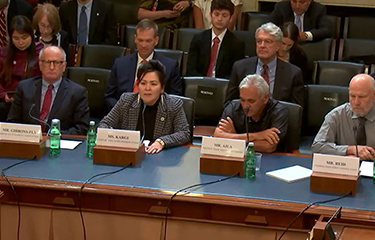The U.S. government’s use of marine protected areas, sanctuaries, and monuments to conserve areas of the ocean came under fire during a congressional hearing this week, with House lawmakers and a bevy of witnesses decrying the use of executive authority to establish wide bands of ocean where commercial fishing is banned instead of relying on the existing regulatory system to protect fishing stocks.
“President Biden’s weaponization of marine protected areas designation is another example of his rampant abuse of executive authority to promote his radical climate agenda and social change initiatives without due consideration of the negative consequences for the economy, environment, and thousands of working Americans,” U.S. House Committee on Natural Resources Subcommittee on Oversight and Investigations Chairman Paul Gosar (R-Arizona) said.
Environmental groups have praised the Biden administration’s ocean conservation efforts, including his signature “30 by 30” goal of committing 30 percent of the country’s lands and oceans to conservation by 2030. The federal government has also dedicated billions of dollars to ocean climate and conservation programs through the Inflation Reduction Act and the Infrastructure Investment and Jobs Act.
However, the administration’s reliance on the establishment of marine protected areas (MPAs), sanctuaries, and monuments have received significant pushback from some commercial fishermen and fishing communities, who argue that the arbitrary processes used to create those designations lack scientific backing and bypass the nation’s regulatory system.
“Actions under [the Antiquities Act and the National Marine Sanctuaries Act] have been and are being used to bypass and override the rigorous, science-based, and participatory fisheries management system established by Congress over several decades,” American Tunaboat Association Executive Director Bill Gibbons-Fly said in prepared remarks. “Moreover, these actions are being taken with little thought to the economic consequences to an important sector of the U.S. economy, the economies of our U.S. territories, domestic and regional food security, and yes, even U.S. national security."
There was also specific pushback against the Biden administration’s efforts to establish a new marine sanctuary in the Pacific Remote Islands, which would put protections on 770,000 square miles of ocean.
“Fishermen, the Western Pacific Regional Fishery Management Council, over one thousand StarKist Samoan cannery workers, myself, our governor of American Samoa, and most other local officials representing ours and other Pacific territories, are all pushing back against NOAA’s plans for an expanded marine sanctuary around Pacific Remote Islands Marine National Monument,” U.S. Rep. Aumua Amata Coleman Radewagen (R-American Samoa).
The Western Pacific Fishery Management Council reaffirmed its opposition to the sanctuary at its latest meeting, with the council’s scientific advisors reporting that that the majority of the objectives for expanding the monument are already met by fishing regulations in place.
Coastal Villages Region Fund (CDRF) Regional Affairs Manager Florence Kargi also testified on the proposed marine sanctuary in the Bering Sea, reiterating the organization’s opposition to the designation. Kargi said the sanctuary was a threat to the Western Alaska Community Development Quota program, which relies on commercial fisheries revenue to support local economic development in communities with extreme poverty. According to Kargi, a sanctuary designation could allow a small tribe to overrule the North Pacific Fishery Management Council’s commercial fishery regulations, potentially shutting off a key source of revenue for those programs.
“The Magnuson-Stevens Act requires that fisheries are sustainable and that fishing communities are treated fairly, and the National Marine Sanctuaries Act does not require sustainability or fairness,” Kargi told lawmakers. “The Bering Sea fisheries funds our programs, so if the Bering Sea is not managed under the Magnuson-Stevens Act, then our programs are at risk.”
Both Gosar and Gibbons-Fly hammered the Biden administration’s conservation efforts for negatively affecting underserved and disadvantaged communities.
“The “30 by 30” effort is being applied to an exceptionally disproportionate degree on fisheries and underserved communities in the Pacific Islands region,” Gibbons-Fly said. “This severely disproportionate burden on U.S. Pacific Islands seems directly at odds with President Biden’s focus on environmental equity and justice through multiple executive orders, in particular with respect to the needs of marginalized and underserved communities, such as the U.S. Pacific territories.”
“It seems most disadvantaged communities are almost always the ones hit hardest by this economically restrictive eco-policies,” Gosar said.
New England Fishery Management Council Chair Eric Reid also voiced opposition to the federal government’s use of the Antiquities Act to create marine monuments, pointing out that the requirements for establishing a monument paled in comparison to the documentation required by the regional fishery management councils to implement commercial fishing regulations.
Not all of the witnesses and legislators were opposed to the administration’s use of marine protected areas for ocean conservation. Ranking member U.S. Rep. Melanie Stansbury (D-New Mexico) defended the federal government’s approach, arguing that the administration needed to use every measure it can to combat the threats to the world’s oceans.
“The time has long since passed to ask if we should be protecting our oceans. Instead, we should be asking how do we use every tool possible to ensure that we are protecting them, and that is one of the reasons we have marine protected areas,” Stansbury said. “Protected areas protect marine life and critical habitats. They support diverse ecosystems. They help build resilience against the impacts of climate change and will help mitigate the long-term impacts of climate change.”
U.S. Rep. Ed Case (D-Hawaii) also pushed back on the more catastrophic claims about how a Pacific Remote Islands sanctuary would affect industry, noting that similar predictions of an industrial collapse over previous monument and sanctuary designations failed to materialize.
“This sounds like déjà vu all over again,” Case said.
Photo courtesy of Nathan Strout







